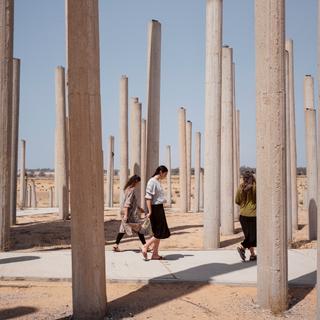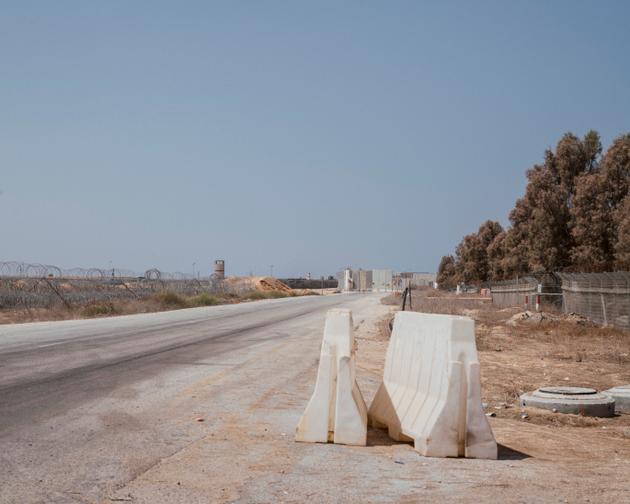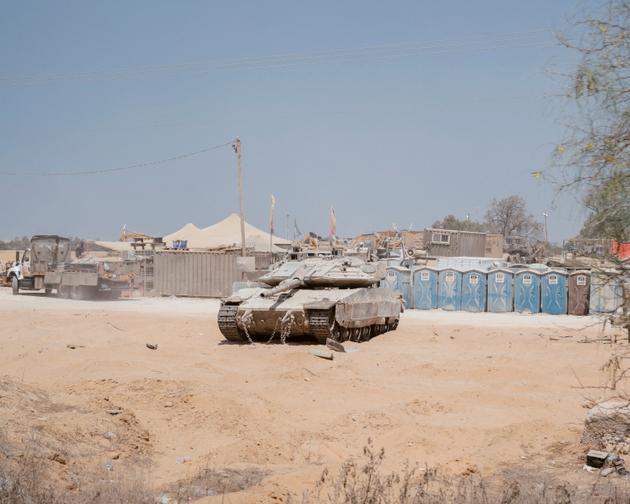


Traveling Israel's Route 232, a year after Hamas's massacre along it
Long ReadThis road, which runs along the Gaza Strip in southern Israel, was used by Hamas during the attack on October 7, 2023. A year later, it has become a linear memorial, lined with makeshift shrines, photos of the missing and QR codes giving visitors information about what happened.
The route begins here, at the crossroads of Israel, Egypt and Gaza, on a huge, empty parking lot, weighed down by a still-powerful sun: at the Kerem Shalom crossing. The place, as vast as an airport tarmac, looks like a high-altitude lake giving birth to a river – Route 232. On the morning of October 7, 2023, it was along this route that Hamas commandos, after emerging from the enclave, swooped down on the "Gaza Envelope," the name given to the region surrounding the strip. Aboard pick-ups and motorcycles, armed with machine guns, rocket launchers and grenades, they unleashed their murderous rage on the area, indiscriminately attacking civilians and soldiers, kibbutzniks and Nova festivalgoers, Israelis, Palestinians with Israeli citizenship, foreign workers from Thailand, the Philippines and elsewhere.

Built piece by piece, Route 232 is narrow and tortuous, buckling under the heat and the passage of tanks in its oldest part, to the north. To the south, towards the Egyptian border, it is wide and straight, the asphalt as smooth as dark ice, lined with greenhouses, agricultural facilities and an ever-growing number of Israeli settlements, from kibbutzim to moshavim (farming communities). Route 232 is both civilian and militarized, like Israel, often referred to as a nation in arms. Trucks filled with vegetables cross paths with army vehicles. Bus stops, petrol stations and crossroads are equipped with rocket shelters to protect against salvos fired from Gaza.
The course of Route 232 also reflects Israel's strategy in its relations with the Palestinians: it follows the border of the enclave without touching it, like two parallels that only meet in conflict. Only from Sderot onwards does the road lose its militarized appearance, when it leaves the Gaza envelope to continue northwards and join the N4, like a river flowing into a river.

The points of contact with the enclave are also militarized, like the Kerem Shalom terminal, opened in 2005, when Israel was evacuating the Gaza settlements as part of its unilateral disengagement plan. The blockade imposed by Israel and Egypt in 2007, after Hamas took control of the territory gave way on October 7, 2023. The Islamist movement's assault, of rare violence, caused the death of 1,200 Israelis, including 800 civilians, and led to the capture of some 250 people. Around 100 of them, of which it is not known how many are still alive, remain in its hands, while 154 have been released.
Soldiers back in the barracks
Like a body covered in scars, the road bears the stigma of this attack, as well as other, older ones. Some of the posters pasted on road signs date back to before October 7, 2023. They honor the memory of two soldiers, Hadar Goldin and Oron Shaul, captured in 2014 by Hamas and declared dead by the army. Their bodies are still in the hands of the Palestinian Islamist movement. Hamas never succeeded in negotiating their release in exchange for Palestinian prisoners.
You have 83.14% of this article left to read. The rest is for subscribers only.
